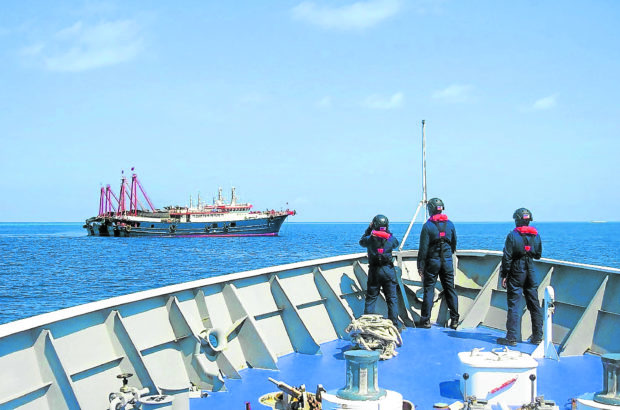
FILE PHOTO: The Philippine Coast Guard (PCG) personnel aboard BRP Cabra monitor Chinese vessels at Sabina Shoal west of Palawan province in this photo taken by the PCG on April 27, 2021. The Filipino crew informed the Chinese that they were inside the Philippines’ exclusive economic zone. The Chinese ships left as Cabra approached them.
MANILA, Philippines — It wouldn’t be the first time the Philippines is calling on China to respect its rights over the West Philippine Sea.
But with more than a hundred Chinese vessels swarming the disputed waters and a recent near-collision between a China Coast Guard ship and a Philippine patrol vessel near Ayungin Shoal, the Department of Foreign Affairs (DFA) has again told China to abide by the law of the sea.
“First of all, I would like to emphasize that the Philippines has the legal right to carry out routine maritime patrols in our territorial waters and exclusive economic zone,” DFA spokesperson Teresita Daza said in a statement on Friday.
This, she noted, includes the patrolling of the Philippine Coast Guard in the West Philippine Sea from April 18 to 24, where they monitored more than a hundred suspected Chinese maritime militia vessels, a People’s Liberation Army warship, and two China Coast Guard vessels.
READ: More than 100 Chinese maritime militia vessels, warship still in West Philippine Sea — PCG
“The China Coast Guard’s interference with this routine patrol mission was totally inconsistent with freedom of navigation, and a number of documented incidents also involved highly dangerous maneuvers that were contrary to standard navigational practices,” Daza said.
She also cited the April 23 near-crash of PCG’s BRP Malapascua and a China Coast Guard vessel more than twice its size in waters near the Ayungin Shoal.
READ: Chinese, Philippine vessels in ‘David and Goliath’ near-crash
“We again call on China to respect the Philippines’ rights over the West Philippine Sea, as provided by United Nations Convention on the Law of the Sea, and refrain from actions that may cause an untoward incident,” Daza said.
But China, who had repeatedly undermined the 2016 ruling that invalidates its historic claims in nearly the entire South China Sea, said the near-collision of the vessels was a “premeditated and provocative action” on the part of the Philippines, with the goal “to deliberately find fault and take the opportunity to hype up the incident.”
READ: China says Philippine boat’s ‘provocative action’ caused near-crash
Daza, however, said routine patrols in Philippine waters “can neither be premeditated nor provocative.”
“It is a legal right that we exercised and will continue to exercise,” she reiterated.
Daza noted that the DFA is still reviewing its possible course of action following the recent incidents.
She further said that the “direct communication mechanism” between Manila and Beijing’s foreign ministries — created to prevent miscommunication and miscalculation in the event of a maritime dispute — was used shortly after the dangerous face-off between the Chinese and Philippine vessels.
“Our focal person received a call from his Chinese counterpart [regarding] this incident last April 23 at 5:56 p.m. Our side informed China that it was a routine patrol and that we have every right to carry out such an activity,” Daza added.
Following a meeting with Chinese Foreign Minister Qin Gang last week, President Ferdinand “Bongbong” Marcos Jr. said more communication lines will be established between both nations to avoid conflict in the West Philippine Sea.
After taking the helm of the country last year, the pressure is on President Ferdinand Marcos Jr.’s shoulders to assert the landmark decision of the Permanent Court of Arbitration in 2016, rejecting Beijing’s sweeping claims in the South China Sea.
Aside from the Philippines, Vietnam, Malaysia, Brunei, and Indonesia also have competing claims in the contested waterway.

